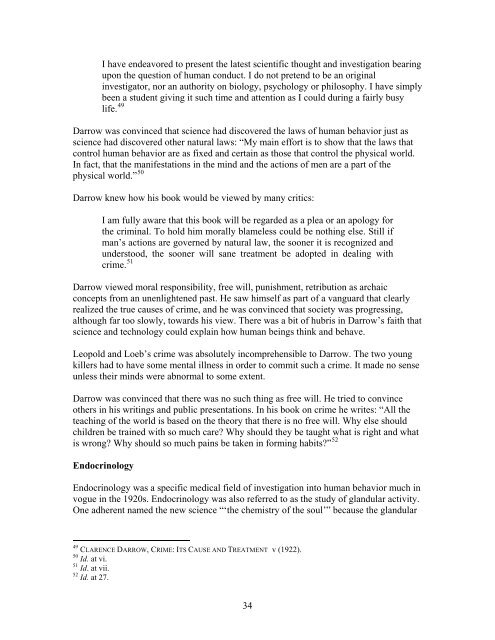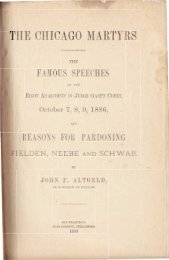Leopold and Loeb Trial - The Clarence Darrow Collection
Leopold and Loeb Trial - The Clarence Darrow Collection
Leopold and Loeb Trial - The Clarence Darrow Collection
You also want an ePaper? Increase the reach of your titles
YUMPU automatically turns print PDFs into web optimized ePapers that Google loves.
I have endeavored to present the latest scientific thought <strong>and</strong> investigation bearing<br />
upon the question of human conduct. I do not pretend to be an original<br />
investigator, nor an authority on biology, psychology or philosophy. I have simply<br />
been a student giving it such time <strong>and</strong> attention as I could during a fairly busy<br />
life. 49<br />
<strong>Darrow</strong> was convinced that science had discovered the laws of human behavior just as<br />
science had discovered other natural laws: “My main effort is to show that the laws that<br />
control human behavior are as fixed <strong>and</strong> certain as those that control the physical world.<br />
In fact, that the manifestations in the mind <strong>and</strong> the actions of men are a part of the<br />
physical world.” 50<br />
<strong>Darrow</strong> knew how his book would be viewed by many critics:<br />
I am fully aware that this book will be regarded as a plea or an apology for<br />
the criminal. To hold him morally blameless could be nothing else. Still if<br />
man’s actions are governed by natural law, the sooner it is recognized <strong>and</strong><br />
understood, the sooner will sane treatment be adopted in dealing with<br />
crime. 51<br />
<strong>Darrow</strong> viewed moral responsibility, free will, punishment, retribution as archaic<br />
concepts from an unenlightened past. He saw himself as part of a vanguard that clearly<br />
realized the true causes of crime, <strong>and</strong> he was convinced that society was progressing,<br />
although far too slowly, towards his view. <strong>The</strong>re was a bit of hubris in <strong>Darrow</strong>’s faith that<br />
science <strong>and</strong> technology could explain how human beings think <strong>and</strong> behave.<br />
<strong>Leopold</strong> <strong>and</strong> <strong>Loeb</strong>’s crime was absolutely incomprehensible to <strong>Darrow</strong>. <strong>The</strong> two young<br />
killers had to have some mental illness in order to commit such a crime. It made no sense<br />
unless their minds were abnormal to some extent.<br />
<strong>Darrow</strong> was convinced that there was no such thing as free will. He tried to convince<br />
others in his writings <strong>and</strong> public presentations. In his book on crime he writes: “All the<br />
teaching of the world is based on the theory that there is no free will. Why else should<br />
children be trained with so much care? Why should they be taught what is right <strong>and</strong> what<br />
is wrong? Why should so much pains be taken in forming habits?” 52<br />
Endocrinology<br />
Endocrinology was a specific medical field of investigation into human behavior much in<br />
vogue in the 1920s. Endocrinology was also referred to as the study of gl<strong>and</strong>ular activity.<br />
One adherent named the new science “‘the chemistry of the soul’” because the gl<strong>and</strong>ular<br />
49<br />
CLARENCE DARROW, CRIME: ITS CAUSE AND TREATMENT v (1922).<br />
50<br />
Id. at vi.<br />
51<br />
Id. at vii.<br />
52<br />
Id. at 27.<br />
34

















